10 Quick Nutrition Tips Every Swimmer Should Follow
Nutrition plays a very important part in a swimmer’s training but is something that is often neglected by many swimmers. This may be because most swimmers do not consider nutrition to be an essential part of their training program.
The truth is though swimmers can do with just a good training regime, their results would be much better if they also pay special attention to their nutrition.
Listed below are some important nutrition tips from expert following which one can excel at his or her swimming performance.
Complex Carbohydrates
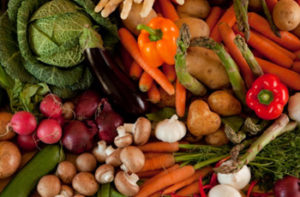 The first thing to keep in mind is it makes sense to consume as many complex carbohydrates as possible. Typically, swimmers should consume between six and ten grams of carbs for every kilo of their body weight. Thus, if you weigh 160 pounds, you should consume between 580 and 720 grams of carbs.
The first thing to keep in mind is it makes sense to consume as many complex carbohydrates as possible. Typically, swimmers should consume between six and ten grams of carbs for every kilo of their body weight. Thus, if you weigh 160 pounds, you should consume between 580 and 720 grams of carbs.
Recommended Read: Calculate your Calories
More importantly, you should also consume complex carbs like legumes such as lentils and beans as well as peas. In addition, make sure you consume whole grains like oats and brown rice as well as whole grain breads.
Finally, consuming as many fruits and vegetables as you can because the body can absorb them quickly.
Simple Carbs
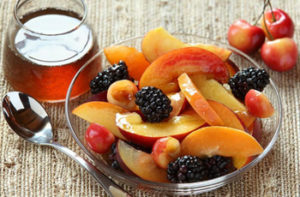 Second, make sure you consume simple carbs before your workout, during it as well as immediately following your workout.
Second, make sure you consume simple carbs before your workout, during it as well as immediately following your workout.
Simple carbs are not bad for the body as it can easily and quickly digest simple sugars.
Sports drinks contain carbs that include simple sugar and this is a quick and ready to burn fuel that will work well when you go in pool.
Pretzels, honey and fruits are recommended if you want to improve your performance in the swimming pool.
Get right amount of Protein
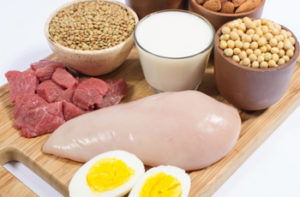 Consuming a small amount of protein before working out is healthy and recommended. Ideally, a swimmer should consume between 0.15 to 0.25 grams of protein for every kilo of body weight.
Consuming a small amount of protein before working out is healthy and recommended. Ideally, a swimmer should consume between 0.15 to 0.25 grams of protein for every kilo of body weight.
For best results, the protein should be consumed about an hour prior to working out.
Proteins before a workout work best because it provides the body with the right nitrogen balance and thus help to improve the uptake of protein into the muscles.
The result is lower risk of muscle tissue breakdown and less gastric emptying.
After workout meals
After completing a workout, swimmers need to attain a 3 to 4: 1 carbs to protein ratio. Protein helps swimmers workout and is vital for building muscles and recovery. In fact, it is important for swimmers to also consume carbs with their protein after working out.
The carbs will replenish the store of glycogen and at the same time it will also improve insulin response. So, taking three to four grams of carbs with every gram of protein is going to provide excellent results. Consuming chocolate milk is one way of achieving this goal.
High quality protein instead of high quantity of protein
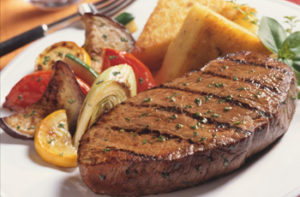 It is important to consume high quality protein instead of high quantity of protein. Most swimmers make the mistake of consuming too much protein.
It is important to consume high quality protein instead of high quantity of protein. Most swimmers make the mistake of consuming too much protein.
However, doing so means their bodies will not be able to synthesize all the protein and that in turn means the rest of the protein will be stored as fat.
It makes more sense to consume HBV protein or High-biological Value protein. Whole eggs and milk as well as fish, beef and soy beans are what you need to consume to get the required intake of HBV protein.
Well-balanced diet
It is important to consume a well-balanced diet. A well-balanced diet ensures that swimmers will be able to meet their body’s necessary vitamin and mineral needs. Water contains the right micro-nutrients that in turn help to improve performance and keep you feeling healthy.
Phosphorous is a mineral that provides more energy while calcium keeps the bones in good health. Calcium also ensures that your muscles will contract properly. Vitamin B1 and Thiamine known to provide better carbs metabolism.
Vitamin D
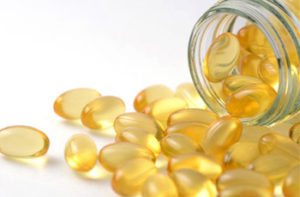 Vitamin D consumption ensures your body will be able to build muscles more efficiently. Vitamin D is becoming very popular in sport performance.
Vitamin D consumption ensures your body will be able to build muscles more efficiently. Vitamin D is becoming very popular in sport performance.
It not only keeps the bones in good health but it also keeps the muscles strong and healthy.
Vitamin D also ensures better muscle synthesis and improved muscle contraction.
So, be sure to consume fatty fish like tuna and salmon as well as mackerel. Complement that with cheese and egg yolks as well as fortified milk. About 100 mg of vitamin D in NCAA swimmers were effective in maintaining their Vitamin D status.
Stay well hydrated
Finally, make sure you stay well hydrated. Being hydrated is important and water is the most important nutrient for improved sports performance. Dehydration on the other hand can adversely affect the body’s capacity to work by up to thirty percent. A 2.6 percent loss of body weight because of dehydration can lead to a forty-five percent reduction in exercise performance.
Now that we know some of the best diet for swimmers, here is the diet plans from the world’s best swimmers:
The Michael Phelps diet plan
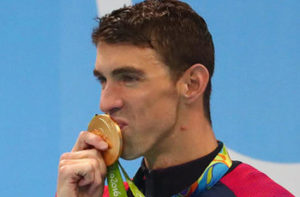 Michael Phelps, though retired now, consumed as many as 12, 000 calories each day. An average person requires a sixth of that while power lifters consume about 8000 calories per day. His breakfast consisted of 3 fried egg sandwiches with cheese and lettuce as well as tomatoes and fried onions with mayonnaise.
Michael Phelps, though retired now, consumed as many as 12, 000 calories each day. An average person requires a sixth of that while power lifters consume about 8000 calories per day. His breakfast consisted of 3 fried egg sandwiches with cheese and lettuce as well as tomatoes and fried onions with mayonnaise.
He also consumed a toast and omelets as well as 3 pancakes and two cups of coffee. This is enough to feed a typical family. Other than those foods, Phelps also consumed cereals or oatmeal and after practicing, he consumed another egg and omelets as well as some veggies.
For lunch, he consumed a pound of pasta and a pair of ham and cheese sandwiches as well as about 1000 kcal of energy drinks. For dinner, he consumed another pound of pasta and a pizza as well as more of his favorite energy drinks. He also consumed protein supplements to ensure his muscles were always in peak condition.
Missy Franklin’s advice
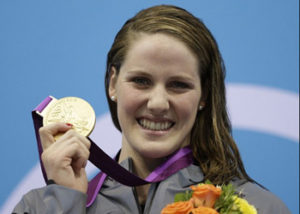 Missy Franklin, another top swimmer would wake up at 6:30 every day and then she had a sumptuous breakfast. She also drank coffee to stay awake the whole day.
Missy Franklin, another top swimmer would wake up at 6:30 every day and then she had a sumptuous breakfast. She also drank coffee to stay awake the whole day.
Her favorite recovery drink was chocolate milk as it provided her body with the perfect amount of sugar to ensure better protein and carbs absorption.
Kate Ziegler
 Kate Ziegler on the other hand, a well-known Olympic swimmer, was used to eating a lot of meat and was not very particular about her diet.
Kate Ziegler on the other hand, a well-known Olympic swimmer, was used to eating a lot of meat and was not very particular about her diet.
However, once she started focusing on her diet, she began to consume more fruits and vegetables and she also concentrated on consuming a plant-based diet. She regularly consumes quinoa and lentils as well as beans, salsa and some bell peppers.
Other than that, she also consumes nutritional yeast to give the cheese a better flavor. Her favorite food is sweet potatoes while her favorite high-protein foods include lentils and beans as well as plenty of nuts.

